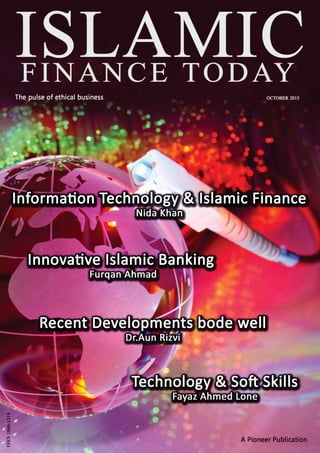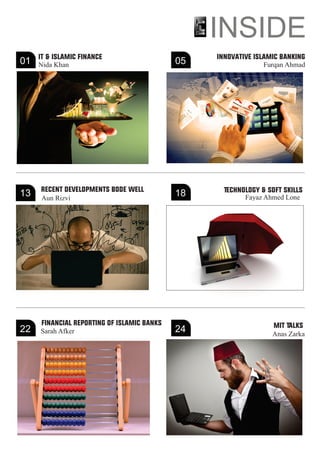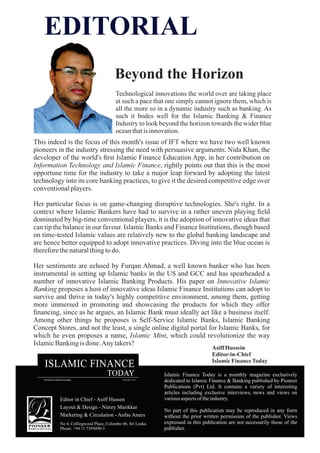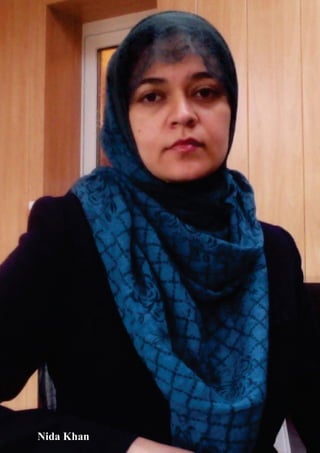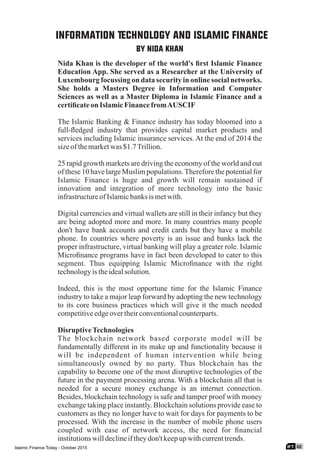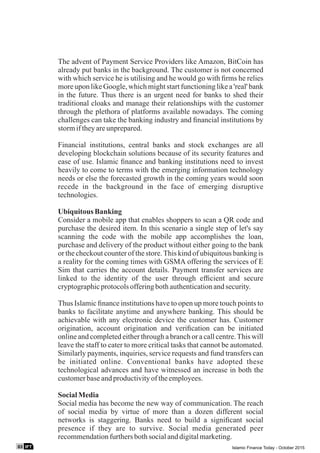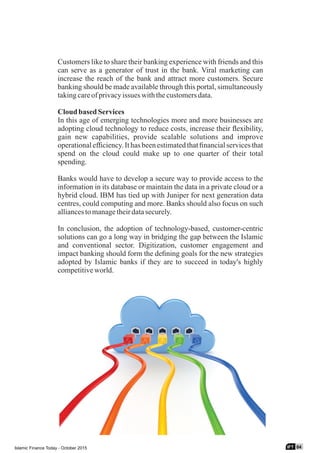Nida Khan
- 2. it & Islamic Finance Nida Khan INSIDE 01 Innovative Islamic Banking Furqan Ahmad05 13 18 MIT Talks 22 Sarah Afker 24 Recent Developments bode well Aun Rizvi Technology & Soft Skills Fayaz Ahmed Lone Financial Reporting of Islamic banks Anas Zarka
- 3. This indeed is the focus of this month's issue of IFT where we have two well known pioneers in the industry stressing the need with persuasive arguments. Nida Khan, the developer of the world's ïŽrst Islamic Finance Education App, in her contribution on Information Technology and Islamic Finance, rightly points out that this is the most opportune time for the industry to take a major leap forward by adopting the latest technology into its core banking practices, to give it the desired competitive edge over conventionalplayers. Her particular focus is on game-changing disruptive technologies. She's right. In a context where Islamic Bankers have had to survive in a rather uneven playing ïŽeld dominated by big-time conventional players, it is the adoption of innovative ideas that can tip the balance in our favour. Islamic Banks and Finance Institutions, though based on time-tested Islamic values are relatively new to the global banking landscape and are hence better equipped to adopt innovative practices. Diving into the blue ocean is thereforethenaturalthingtodo. Her sentiments are echoed by Furqan Ahmad, a well known banker who has been instrumental in setting up Islamic banks in the US and GCC and has spearheaded a number of innovative Islamic Banking Products. His paper on Innovative Islamic Banking proposes a host of innovative ideas Islamic Finance Institutions can adopt to survive and thrive in today's highly competitive environment, among them, getting more immersed in promoting and showcasing the products for which they offer ïŽnancing, since as he argues, an Islamic Bank must ideally act like a business itself. Among other things he proposes is Self-Service Islamic Banks, Islamic Banking Concept Stores, and not the least, a single online digital portal for Islamic Banks, for which he even proposes a name, Islamic Mint, which could revolutionize the way IslamicBankingis done.Any takers? Beyond the Horizon Islamic Finance Today is a monthly magazine exclusively dedicated to Islamic Finance & Banking published by Pioneer Publications (Pvt) Ltd. It contains a variety of interesting articles including exclusive interviews, news and views on variousaspectsoftheindustry. No part of this publication may be reproduced in any form without the prior written permission of the publisher. Views expressed in this publication are not necessarily those of the publisher. Editor in Chief - Asiff Hussen Layout & Design - Nimry Marikkar Marketing & Circulation - Anfas Anees No 4, Collingwood Place, Colombo 06, Sri Lanka. Phone: +94 11 7395090-3 EDITORIAL Asiff Hussein Editor-in-Chief IslamicFinanceToday Technological innovations the world over are taking place at such a pace that one simply cannot ignore them, which is all the more so in a dynamic industry such as banking. As such it bodes well for the Islamic Banking & Finance Industry to look beyond the horizon towards the wider blue oceanthatisinnovation.
- 4. Nida Khan
- 5. Nida Khan is the developer of the world's ïŽrst Islamic Finance Education App. She served as a Researcher at the University of Luxembourg focussing on data security in online social networks. She holds a Masters Degree in Information and Computer Sciences as well as a Master Diploma in Islamic Finance and a certiïŽcateon IslamicFinancefromAUSCIF The Islamic Banking & Finance industry has today bloomed into a full-ïŽedged industry that provides capital market products and services including Islamic insurance services. At the end of 2014 the sizeofthemarketwas $1.7Trillion. 25 rapid growth markets are driving the economy of the world and out of these 10 have large Muslim populations.Therefore the potential for Islamic Finance is huge and growth will remain sustained if innovation and integration of more technology into the basic infrastructureofIslamicbanksismetwith. Digital currencies and virtual wallets are still in their infancy but they are being adopted more and more. In many countries many people don't have bank accounts and credit cards but they have a mobile phone. In countries where poverty is an issue and banks lack the proper infrastructure, virtual banking will play a greater role. Islamic MicroïŽnance programs have in fact been developed to cater to this segment. Thus equipping Islamic MicroïŽnance with the right technologyistheidealsolution. Indeed, this is the most opportune time for the Islamic Finance industry to take a major leap forward by adopting the new technology to its core business practices which will give it the much needed competitiveedgeovertheirconventionalcounterparts. DisruptiveTechnologies The blockchain network based corporate model will be fundamentally different in its make up and functionality because it will be independent of human intervention while being simultaneously owned by no party. Thus blockchain has the capability to become one of the most disruptive technologies of the future in the payment processing arena. With a blockchain all that is needed for a secure money exchange is an internet connection. Besides, blockchain technology is safe and tamper proof with money exchange taking place instantly. Blockchain solutions provide ease to customers as they no longer have to wait for days for payments to be processed. With the increase in the number of mobile phone users coupled with ease of network access, the need for ïŽnancial institutionswilldeclineiftheydon'tkeepupwithcurrenttrends. Information Technology and Islamic Finance By Nida Khan IFT 02Islamic Finance Today - October 2015
- 6. The advent of Payment Service Providers like Amazon, BitCoin has already put banks in the background. The customer is not concerned with which service he is utilising and he would go with ïŽrms he relies more upon like Google, which might start functioning like a 'real' bank in the future. Thus there is an urgent need for banks to shed their traditional cloaks and manage their relationships with the customer through the plethora of platforms available nowadays. The coming challenges can take the banking industry and ïŽnancial institutions by stormiftheyareunprepared. Financial institutions, central banks and stock exchanges are all developing blockchain solutions because of its security features and ease of use. Islamic ïŽnance and banking institutions need to invest heavily to come to terms with the emerging information technology needs or else the forecasted growth in the coming years would soon recede in the background in the face of emerging disruptive technologies. Ubiquitous Banking Consider a mobile app that enables shoppers to scan a QR code and purchase the desired item. In this scenario a single step of let's say scanning the code with the mobile app accomplishes the loan, purchase and delivery of the product without either going to the bank or the checkout counter of the store.This kind of ubiquitous banking is a reality for the coming times with GSMA offering the services of E Sim that carries the account details. Payment transfer services are linked to the identity of the user through efïŽcient and secure cryptographicprotocolsofferingbothauthenticationandsecurity. Thus Islamic ïŽnance institutions have to open up more touch points to banks to facilitate anytime and anywhere banking. This should be achievable with any electronic device the customer has. Customer origination, account origination and veriïŽcation can be initiated online and completed either through a branch or a call centre.This will leave the staff to cater to more critical tasks that cannot be automated. Similarly payments, inquiries, service requests and fund transfers can be initiated online. Conventional banks have adopted these technological advances and have witnessed an increase in both the customerbaseandproductivityoftheemployees. SocialMedia Social media has become the new way of communication. The reach of social media by virtue of more than a dozen different social networks is staggering. Banks need to build a signiïŽcant social presence if they are to survive. Social media generated peer recommendationfurthersbothsocialanddigitalmarketing. IFT03 Islamic Finance Today - October 2015
- 7. Customers like to share their banking experience with friends and this can serve as a generator of trust in the bank. Viral marketing can increase the reach of the bank and attract more customers. Secure banking should be made available through this portal, simultaneously takingcareofprivacyissues withthecustomersdata. Cloud based Services In this age of emerging technologies more and more businesses are adopting cloud technology to reduce costs, increase their ïŽexibility, gain new capabilities, provide scalable solutions and improve operationalefïŽciency. It has beenestimatedthatïŽnancialservicesthat spend on the cloud could make up to one quarter of their total spending. Banks would have to develop a secure way to provide access to the information in its database or maintain the data in a private cloud or a hybrid cloud. IBM has tied up with Juniper for next generation data centres, could computing and more. Banks should also focus on such alliancestomanagetheirdatasecurely. In conclusion, the adoption of technology-based, customer-centric solutions can go a long way in bridging the gap between the Islamic and conventional sector. Digitization, customer engagement and impact banking should form the deïŽning goals for the new strategies adopted by Islamic banks if they are to succeed in today's highly competitiveworld. IFT 04Islamic Finance Today - October 2015
